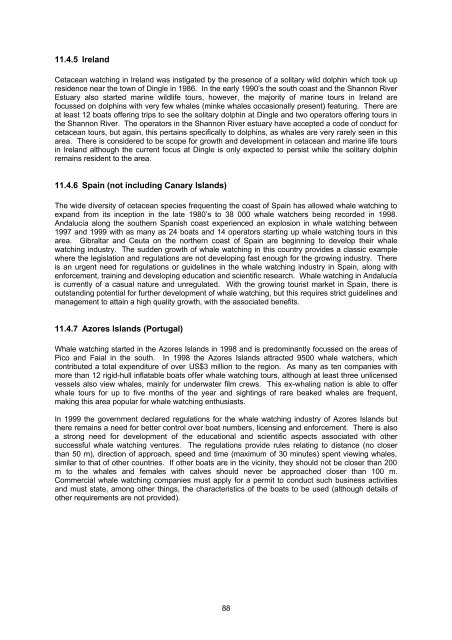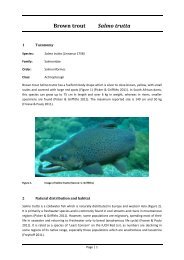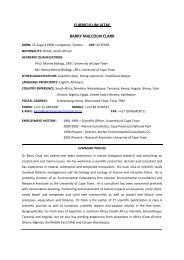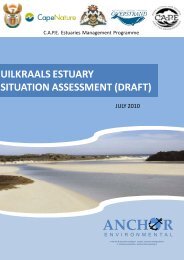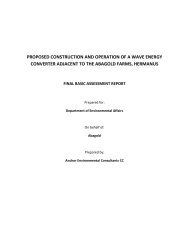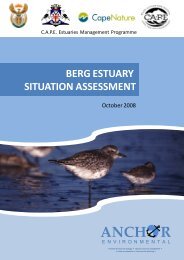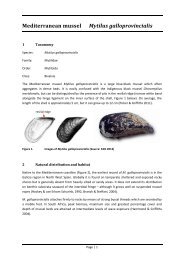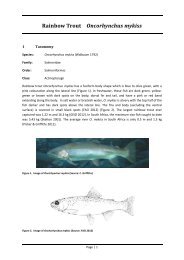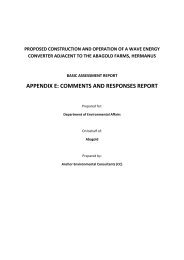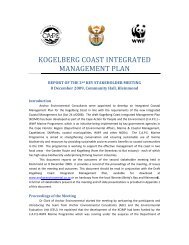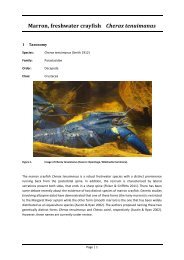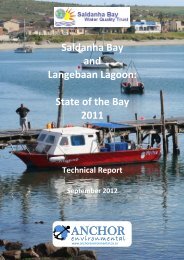Download PDF (2.5MB) - Anchor Environmental
Download PDF (2.5MB) - Anchor Environmental
Download PDF (2.5MB) - Anchor Environmental
You also want an ePaper? Increase the reach of your titles
YUMPU automatically turns print PDFs into web optimized ePapers that Google loves.
11.4.5 Ireland<br />
Cetacean watching in Ireland was instigated by the presence of a solitary wild dolphin which took up<br />
residence near the town of Dingle in 1986. In the early 1990’s the south coast and the Shannon River<br />
Estuary also started marine wildlife tours, however, the majority of marine tours in Ireland are<br />
focussed on dolphins with very few whales (minke whales occasionally present) featuring. There are<br />
at least 12 boats offering trips to see the solitary dolphin at Dingle and two operators offering tours in<br />
the Shannon River. The operators in the Shannon River estuary have accepted a code of conduct for<br />
cetacean tours, but again, this pertains specifically to dolphins, as whales are very rarely seen in this<br />
area. There is considered to be scope for growth and development in cetacean and marine life tours<br />
in Ireland although the current focus at Dingle is only expected to persist while the solitary dolphin<br />
remains resident to the area.<br />
11.4.6 Spain (not including Canary Islands)<br />
The wide diversity of cetacean species frequenting the coast of Spain has allowed whale watching to<br />
expand from its inception in the late 1980’s to 38 000 whale watchers being recorded in 1998.<br />
Andalucía along the southern Spanish coast experienced an explosion in whale watching between<br />
1997 and 1999 with as many as 24 boats and 14 operators starting up whale watching tours in this<br />
area. Gibraltar and Ceuta on the northern coast of Spain are beginning to develop their whale<br />
watching industry. The sudden growth of whale watching in this country provides a classic example<br />
where the legislation and regulations are not developing fast enough for the growing industry. There<br />
is an urgent need for regulations or guidelines in the whale watching industry in Spain, along with<br />
enforcement, training and developing education and scientific research. Whale watching in Andalucía<br />
is currently of a casual nature and unregulated. With the growing tourist market in Spain, there is<br />
outstanding potential for further development of whale watching, but this requires strict guidelines and<br />
management to attain a high quality growth, with the associated benefits.<br />
11.4.7 Azores Islands (Portugal)<br />
Whale watching started in the Azores Islands in 1998 and is predominantly focussed on the areas of<br />
Pico and Faial in the south. In 1998 the Azores Islands attracted 9500 whale watchers, which<br />
contributed a total expenditure of over US$3 million to the region. As many as ten companies with<br />
more than 12 rigid-hull inflatable boats offer whale watching tours, although at least three unlicensed<br />
vessels also view whales, mainly for underwater film crews. This ex-whaling nation is able to offer<br />
whale tours for up to five months of the year and sightings of rare beaked whales are frequent,<br />
making this area popular for whale watching enthusiasts.<br />
In 1999 the government declared regulations for the whale watching industry of Azores Islands but<br />
there remains a need for better control over boat numbers, licensing and enforcement. There is also<br />
a strong need for development of the educational and scientific aspects associated with other<br />
successful whale watching ventures. The regulations provide rules relating to distance (no closer<br />
than 50 m), direction of approach, speed and time (maximum of 30 minutes) spent viewing whales,<br />
similar to that of other countries. If other boats are in the vicinity, they should not be closer than 200<br />
m to the whales and females with calves should never be approached closer than 100 m.<br />
Commercial whale watching companies must apply for a permit to conduct such business activities<br />
and must state, among other things, the characteristics of the boats to be used (although details of<br />
other requirements are not provided).<br />
88


